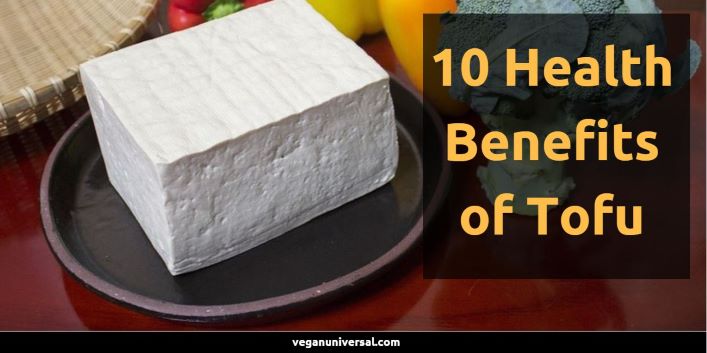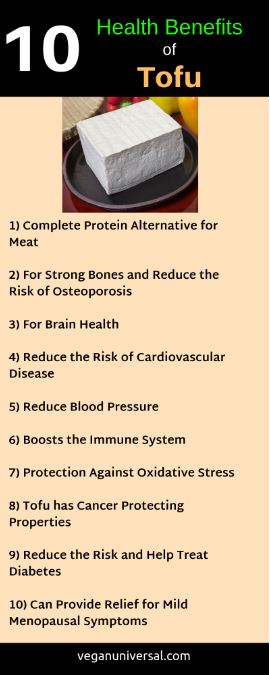
Vegetarians and vegans have enjoyed soy-based foods like tofu also known as bean curd for a long time which is known to be an excellent substitute for animal-based protein that can be high in saturated fat and cholesterol.
In some countries such as China, Japan, Indonesia, Malaysia, Singapore Vietnam, Thailand, and Korea, tofu and soy foods are a protein staple.
Not only tofu is such a versatile product which can be used from salads to baking, it is also loaded with many vital nutrients and health benefits you can enjoy as shown below!
Nutrition Facts of Tofu (raw firm 100g)
- Energy/Calories 144 (DV* 7.2%)
- Protein 17.27g (DV 31%)
- Carbohydrate 2.78g (DV 0.85%)
- Total lipid (fat) 8.72g (DV 14%)
- Calcium 683mg (DV 68%)
- Omega-3 (ALA) 0.58g (DV 36%)
- Iron 2.66mg (DV 14%)
- Manganese 1.2mg (DV 52%)
- Copper 0.38mg (DV 42%)
- Selenium 17.4mcg (DV 32%)
- Magnesium 58mg (DV 16%)
- Fiber 2.3g (DV 8%)
- Zinc 1.57mg (DV 10%)
- Phosphorus 190mg (DV 27%)
- Potassium 237mg (DV 5%)
- Sodium 14mg (DV 0.6%)
- Folate 29µg (DV 7%)
- Vitamin B-6 0.092mg (DV 7%)
- Vitamin B1 0.16mg (DV 13%)
- Vitamin A 166IU (DV 6%)
*Daily Value
Ten Health Benefits of Tofu
1) Complete Protein Alternative for Meat (macronutrient)
Protein is a macronutrient like carbs and fat, which means the body needs a relatively greater quantity of it to sustain.
It is vital for cells, muscles, bones, enzymes, hormones, and blood.
Since the body has no protein store to draw when needed you should continue to include protein-rich food into your diet and tofu is a complete protein with all the nine essential amino acids the body needs.
2) Tofu for Strong Bones and Reduce the Risk of Osteoporosis
Since your bones consist of calcium and your body doesn’t produce calcium, it is important that you get it from diet.
Hence tofu is a great alternative for calcium especially for vegans and possibly a better option than dairy due to its animal protein which can have a calcium-leaching effect.
Postmenopausal women tend to be at risk of osteoporosis which makes bones weaker since their bodies make less estrogen that provides protection against bone loss
But according to a research team led by the University of Hull in the U.K. isoflavones in tofu are similar in structure and function to estrogen and considered to be an effective option in reducing the risk of osteoporosis for women
Further, a medical study in Sweden has shown, women who consumed more milk still had a higher risk of bone fractures whereas people of Okinawa Japan consume a considerable amount of tofu and the incidence of fractures and osteoporosis is low.
3) For Brain Health
Tofu is a good source of alpha-linolenic acid (ALA), which is a type of omega-3 fatty acid. The body can also convert ALA into other two forms of omega-3 i.e. EPA & DHA.
Omega-3 is known to help control blood clotting, build cell membranes in the brain and ALA may also help in preventing and treating depression according to the University of Maryland Medical Center.
One research has found that isoflavones found in tofu and other soy-based products can be linked to a positive influence of nonverbal memory, verbal fluency, and other brain functions.
4) Reduce the Risk of Cardiovascular Disease
Isoflavones in tofu have also been found to aid in reducing the levels of LDL (bad cholesterol), and decrease other risk factors for cardiovascular disease, such as weight, body mass index (BMI), and total cholesterol to improve heart health.
Further isoflavones could lower the levels of oxidized cholesterol and reduce the chances of forming threatening plaques that increase the risk of heart disease.
5) Reduce Blood Pressure
According to research, tofu protein which is fairly high in dietary phosphorus, known to have an inverse association with blood pressure.
Another study has found that people who ate soy products such as tofu had lowered their blood pressure since isoflavones are known to boost enzymes that could widen the arteries that result in lower blood pressure.
6) Boosts the Immune System
Tofu being a rich source of proteins, nutrients, minerals, and other antioxidants, it’s a food source that can boost the immune system.
Your immune system is made up of proteins, therefore antibodies and other immune system cells depend on it, whereas a diet poor in protein can lead to weaker immunity.
Tofu is also a good source of zinc that strengthens the immune system, helps in healing wounds, and a remedy for the common cold.
7) Protection Against Oxidative Stress
When more free radicals exist in your system oxidative stress can occur which causes damage to fatty tissue and DNA that can lead to a vast number of diseases over time such as cardiovascular disease, neurological diseases, cancer, respiratory disease, and kidney disease.
Thankfully tofu comes with precious antioxidants, that can trap or destroy free radicals in order to guard us against oxidative stress.
8) Tofu Comes with Cancer Protecting Properties
Tofu comes with soyasaponins which are regarded to have cancer preventing, immune-regulating and antioxidative properties.
Studies have also shown the ability of genistein, daidzein and other soy compounds found in tofu to contain cancer cell growth, reduce the risk of tumor formation and prevent cancer development by lessening inflammation and blocking proteins that nurture cell growth.
Selenium in tofu may also help in reducing the risk of certain types of cancers due to its ability to minimize DNA damage & oxidative stress, improve the immune system and suppress cancer cells.
This was further evidenced with studies published in the 80s and early 90s that showed how individuals with a deficiency of selenium had an increased risk of cancer.
9) Reduce the Risk and Help Treat Diabetes
Studies suggest soyasaponins in tofu may influence blood glucose levels by regulating plasma glucose levels and prevent diabetic complications with its antioxidant activity.
Traditional antidiabetic drugs tend to have side effects such as weight gain which has the potential to complicate it further though soyasaponins in tofu can reduce body fat which can be a good option for patients with diabetes.
Further isoflavones in tofu can be beneficial for diabetes, due to increased insulin secretion, better blood sugar control, and defense from antioxidants.
10) Can Provide Relief for Mild Menopausal Symptoms
Menopause is a cycle where the female body gradually stops releasing estrogen on a monthly basis and this drop causes a range of menopausal symptoms such as hot flashes, night sweats, and fatigue.
According to The North American Menopause Society, soy isoflavones also found in tofu can be a natural remedy for mild menopausal symptoms rather than opting for estrogen replacement therapy.
Many women have reported a reduction in their hot flashes and night sweats when they regularly consume soy foods such as tofu.
Keep in mind though, tofu being a natural remedy it may take some time (several weeks or even months) before you start seeing an alleviation of menopausal symptoms.

Conclusion
As you learned, tofu is an excellent substitute for meat and has many health benefits that cannot be overlooked especially for vegans!
We encourage you to go for non-GMO tofu and make sure you eat it in moderation few times a week for optimum health.
Note:
If you’re trying tofu for the first time but you have a specific medical condition (including any allergies), taking medications, anticipate surgery, pregnant, lactating, or a parent considering tofu for your child, it’s sensible to consult healthcare professionals before adding it to your diet.
Related Posts:
- Best Vegan Protein Sources
- Vegan Meat Substitutes for Beef, Pork, Chicken, etc. — 40 Plus Products!
- Vegan Egg Substitutes for Egg Dishes and Vegan Baking
- Vegan Cheese Brands
References:
https://ndb.nal.usda.gov/ndb/foods/show/16426
https://www.ncbi.nlm.nih.gov/pmc/articles/PMC4073179/
https://ods.od.nih.gov/factsheets/Omega3FattyAcids-HealthProfessional/
http://www.aicr.org/foods-that-fight-cancer/soy.html
https://www.ncbi.nlm.nih.gov/pmc/articles/PMC5551541/
https://www.ncbi.nlm.nih.gov/pmc/articles/PMC4073179/#B6
https://www.ncbi.nlm.nih.gov/pubmed/10963212
https://www.diabetes.co.uk/features/diabetes-medication-side-effects.html
